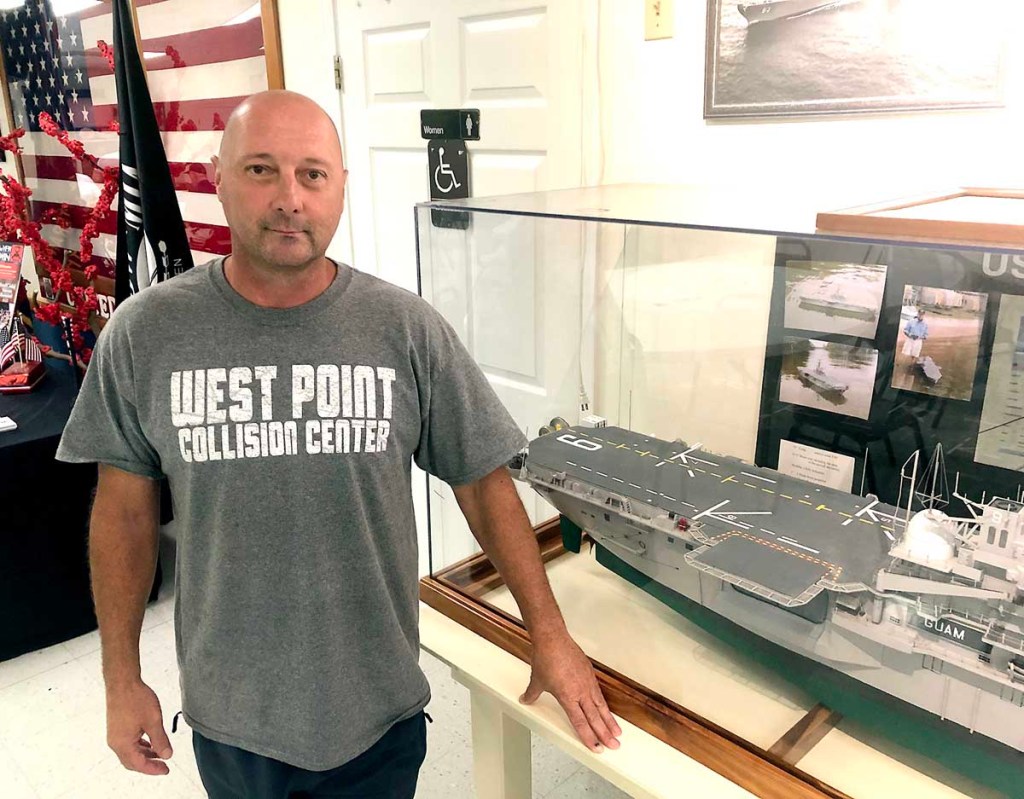‘I just don’t get it’
Published 5:30 am Wednesday, August 18, 2021

- Retired U.S. Army Maj. Shane Sanford, who spent a year in Afghanistan as a Signal Corps officer from 2008 to 2009, is seen Tuesday at the VFW in Cullman.
On TV and across social media, the United States’ disastrous exit from Afghanistan has drawn bewilderment and anger from civilian spectators, and it’s done so on a scale not seen since the fall of Saigon marked an unceremonious end to the Vietnam War in 1975.
That bewilderment takes on deeper meaning for many of the U.S. soldiers who, at some time over the past 20 years, served one or more Afghan tours during the U.S.-led 20-year engagement that first began under President George W. Bush in the wake of the Sept. 11, 2001 terror attacks.
“I have no idea why somebody would pull out like that,” said retired U.S. Army Maj. Shane Sanford, who spent a year in Afghanistan as a Signal Corps officer from 2008 to 2009. “It’s inept. It’s nuts to me…It should be in a guidebook of what not to do.”
Sunday’s fall of Kabul was the topic on everyone’s mind as Sanford and generations of other local veterans gathered Tuesday for lunch at Cullman’s VFW Post 2214. The manner in which the U.S. ceded Kabul to the advancing Taliban, evacuating military personnel ahead of U.S civilians and an established hierarchy of allied support, has been the popular target of Americans’ ire since news of the debacle first broke.
But for Sanford, the strategic loss of U.S. peacekeeping influence in a volatile part of the world is just as frustrating.
“I’ll say this: I think that, for the past 20 years, we have kept Pakistan and Iran at bay. It’s basically the same thing that we’ve been doing with Japan, South Korea, Germany. I mean, what’s the difference with us occupying that space [in Afghanistan] to keep the peace?” he said.
“You have two extreme countries on each side that want to kill us on a daily basis. Why would you pull out of that? It keeps Pakistan and Iran at bay, including China and Russia, and where else would be a better place to be to keep your enemies at bay than right between them? I just don’t get it. I don’t understand.”
As a USASC officer stationed at Forward Operating Base Sharana (a now-retired FOB about a 45-minute flight from Bagram), Sanford didn’t see front line duty. But venturing on the ground beyond the five-mile perimeter of the base, he said, reliably coaxed the regional Taliban to make its presence known.
“If you left the FOB in a vehicle, you’d usually get small arms fire,” he said, noting that for many local Afghanis, the Taliban represented a loosely hierarchical means of organizing the country’s highly-balkanized regions — even if it came with a heavy dose of local corruption. Big-picture American ideas of nation-building and establishing a free society, he said, were hardly on the minds of local Afghanis hoping to earn enough money — or at least clout — to eke out a day’s worth of comfort and peace in their underdeveloped rural surroundings.
“You’re talking about a country where 25 percent of people can read and write. They have no idea what they’re doing. They’re not soldiers,” he said, recalling one anecdote of Afghani civilians who helped dig a fiber network around the base during his own time at Sharana.
“We paid them to come over there and help, and they’d leave at the end of the day with their five-gallon bucket of tools. But after the first week, we had to stop doing that, because they were getting beat up once they left the FOB,” he said. “One guy came in with his arm in a sling, and I asked, ‘What happened to you?’ He couldn’t speak English, but he pointed at his shoulder and he said ‘Taliban.’ Money talks over there.”
Older local veterans, too, recognize similarities between the recent Kabul pullout and America’s exit from Vietnam.
“I think most veterans who’ve been in a combat situation, whether it was Vietnam or Afghanistan or Iraq, feel like our government has really not had our back for the sacrifices that we’ve made and that our families have made,” said retired U.S. Air Force Col. Ken Brown, who also showed up for lunch at the VFW on Tuesday.
“We seem to win all the battles on the battlefield at great cost — and then the political people in Washington give it all away at the end, which is what happened in Vietnam. That same thing has basically happened in Afghanistan: we went over there with the mission of punishing the perpetrators of 9/11 and getting bin Laden and closing down the terrorist training camps in the country.
“We accomplished that — and then we tried to turn it into a nation-building exercise in a tribal, balkanized nation that really isn’t a nation. This time, though, [President Joe] Biden overruled his military advisors, apparently, and made the decision that he was going to arbitrarily pull everybody out.
“We had a secure Bagram air base just north of Kabul. We could have choppered people out from the embassy; we could have roadblocked and convoyed them out from a secure location…but we pulled the military out before we tried to pull the civilians out. It’s frustrating, and it’s a very hard thing for the veterans who’ve served in these conflicts to witness.”





